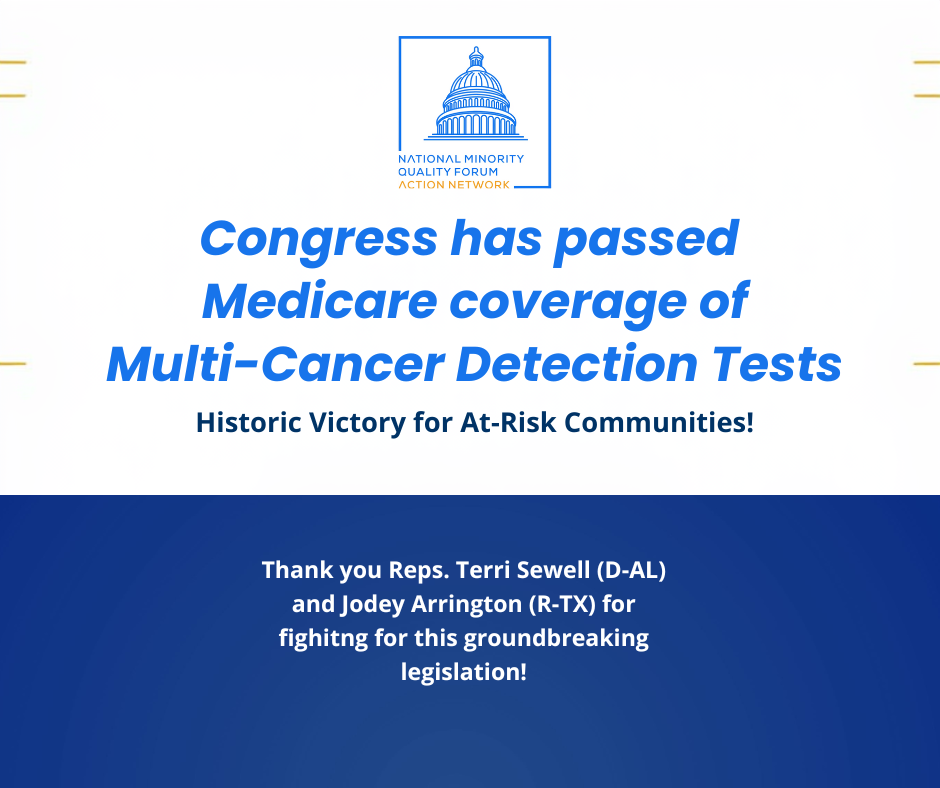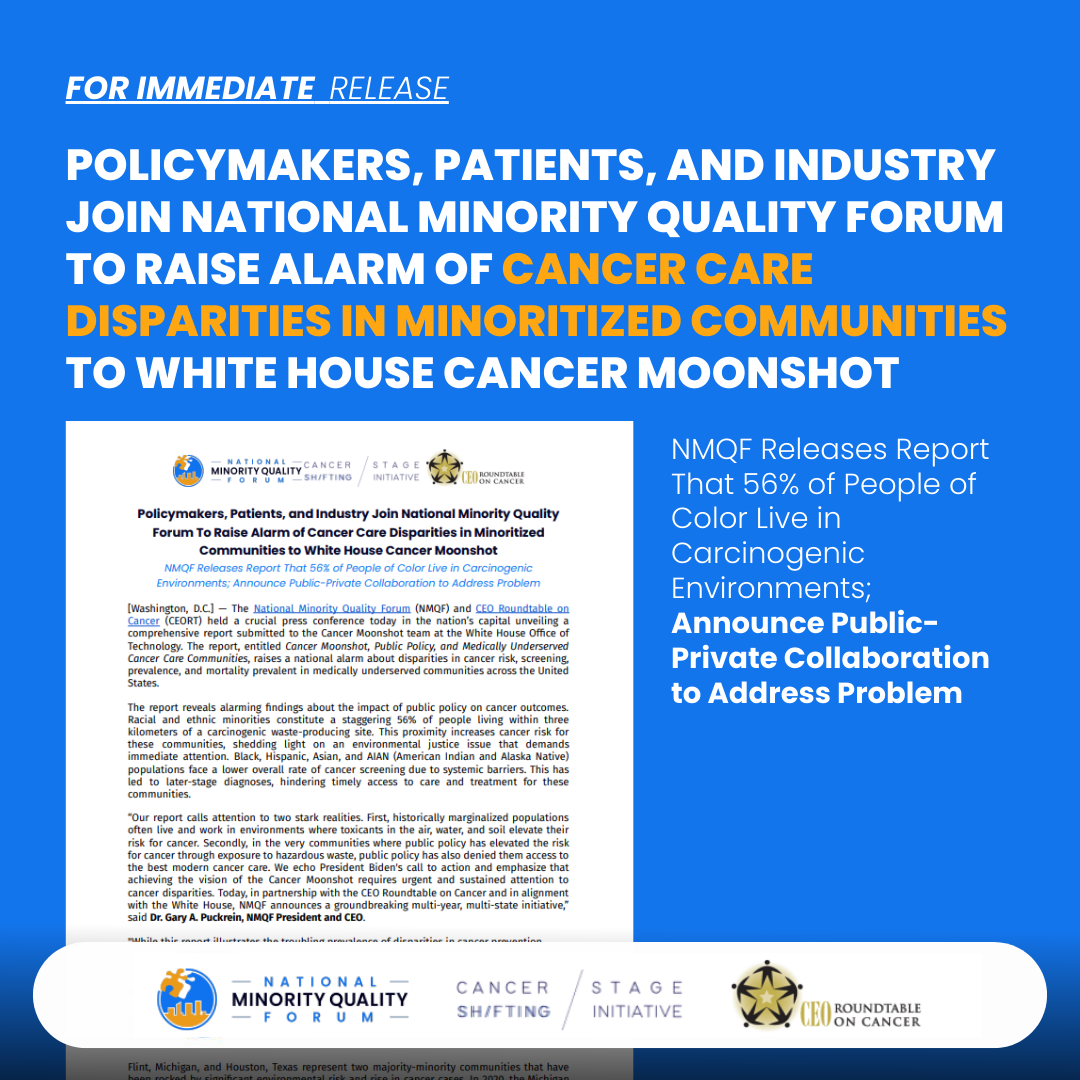
February 05, 2026
By Adjoa Kyerematen
NMQF Statement Applauding Passage of Landmark Legislation to Advance Presymptomatic Cancer Detection
Read More

Policymakers, Patients, and Industry Join National Minority Quality Forum To Raise Alarm of Cancer Care Disparities in Minoritized Communities to White House Cancer Moonshot
NMQF Releases Report That 56% of People of Color Live in Carcinogenic Environments; Announce Public-Private Collaboration to Address Problem
[Washington, D.C.] — The National Minority Quality Forum (NMQF) and CEO Roundtable on Cancer (CEORT) held a crucial press conference today in the nation’s capital unveiling a comprehensive report submitted to the Cancer Moonshot team at the White House Office of Technology. The report, entitled Cancer Moonshot, Public Policy, and Medically Underserved Cancer Care Communities, raises a national alarm about disparities in cancer risk, screening, prevalence, and mortality prevalent in medically underserved communities across the United States.
The report reveals alarming findings about the impact of public policy on cancer outcomes. Racial and ethnic minorities constitute a staggering 56% of people living within three kilometers of a carcinogenic waste-producing site. This proximity increases cancer risk for these communities, shedding light on an environmental justice issue that demands immediate attention. Black, Hispanic, Asian, and AIAN (American Indian and Alaska Native) populations face a lower overall rate of cancer screening due to systemic barriers. This has led to later-stage diagnoses, hindering timely access to care and treatment for these communities.
“Our report calls attention to two stark realities. First, historically marginalized populations often live and work in environments where toxicants in the air, water, and soil elevate their risk for cancer. Secondly, in the very communities where public policy has elevated the risk for cancer through exposure to hazardous waste, public policy has also denied them access to the best modern cancer care. We echo President Biden’s call to action and emphasize that achieving the vision of the Cancer Moonshot requires urgent and sustained attention to cancer disparities.
Today, in partnership with the CEO Roundtable on Cancer and in alignment with the White House, NMQF announces a groundbreaking multi-year, multi-state initiative,” said Dr. Gary A. Puckrein, NMQF President and CEO.
“While this report illustrates the troubling prevalence of disparities in cancer prevention, diagnosis, and treatment, it also tells us where we need to focus our efforts. By joining with both national partners and local communities, we can move one step closer to eliminating cancer as a personal disease and public health problem,” said MaryLisabeth Rich, President of CEO Roundtable on Cancer.
The press conference included a satellite live stream from Flint, Michigan including U.S. Congressman Dan Kildee (D-MI), Mayor of Flint Sheldon Neeley, and community representatives in Houston, Texas.
Flint, Michigan, and Houston, Texas represent two majority-minority communities that have been rocked by significant environmental risk and rise in cancer cases. In 2020, the Michigan Department of Health and Human Services (MDHHS) confirmed that Flint’s increasingly higher poverty rates and population decline coincided with considerably higher cancer rates within certain areas of the city.
Last year, MDHSS announced a three-year environmental epidemiology cancer study for the city of Flint. “Communities like mine have suffered for far too long from poor access to basic health care services, like cancer screenings. That’s why I’m working to pass legislation that would close the gap and expand access to preventative healthcare services. I look forward to working alongside the National Minority Quality Forum to make Flint a healthier and stronger place for all,” said Congressman Dan Kildee (D-MI).
Flint Mayor Neeley announced a city resolution to commit $50,000 towards multi-cancer early detection screening in Flint.
“I lost my mother to breast cancer in 2022, and I experienced with her firsthand the realities of navigating a healthcare system that isn’t necessarily designed to serve you. We know that nationwide, barriers to accessing cancer screening have deadly consequences in communities like Flint. We are seeing widening health disparities as more Black and Brown men especially are diagnosed with cancer too late and are dying as a result. In Flint, we have introduced a first allocation to help our most vulnerable community members access cancer screenings, with more work to come,” said Flint Mayor Sheldon Neeley.
Houston’s Fifth Ward, a historically predominantly Black neighborhood, already has a designated cancer cluster. The city of Houston passed an initiative to set aside $5 million for the voluntary relocation of residents who live near a contaminated groundwater plume.
“The partnership fostered by the Biden Administration’s Moonshot program with Cancer Cluster communities nationwide is of paramount significance. The city of Houston is dedicated to engaging collaboratively with the White House, aiming to deliver an array of health resources, including cancer screening and diagnostic services, to the Fifth Ward,” said John Whitmire, Mayor of the City of Houston.
“As the Fifth Ward faces an alarming surge in rare cancers, often undetected until the final stages, I am heartened by the Biden Administration’s commitment through the Moonshot program. It addresses not just cancer screening and testing, but the deep-seated issues of environmental injustice. I eagerly anticipate collaborating with the administration to bring much-needed relief and support to the residents of the Fifth Ward,” said Council Member Letitia Plummer, City of Houston At-Large 4.
In response to these urgent concerns, NMQF and CEORT announced a comprehensive plan to address the cancer crisis. NMQF will scale a private-public partnership through its Cancer Stage Shifting Initiative to bring national and local resources to 10 majority-minority communities across the country.
This initiative aims to bridge the gaps in cancer prevention, early detection, and treatment in these vulnerable populations.
Speakers at the press conference included representatives from federal, state, and municipal government, pharmaceutical companies, national insurance companies, cancer experts, and community advocates. The collaborative approach underscores the importance of multi-sectoral engagement to address the multifaceted challenges faced by minority communities in the realm of cancer care.
“Cancer affects all of us, but the disease has a notably greater impact on communities of color. As a practicing oncologist, I see the importance of early cancer detection in each of my patients and know that working with the NMQF can help us achieve the White House’s goal of cutting cancer deaths in half through early detection, especially in vulnerable communities,” said Tom Beer, MD, Chief Medical Officer, Multi-Cancer Early Detection, Exact Sciences and Adjunct Professor of Medicine at the OHSU Knight Cancer Institute.
“Sanofi proudly stands with NMQF, our longstanding partner, in fostering cancer care equity for all. Recognizing that cancer patients may be especially vulnerable to vaccine-preventable disease, we’re committed to being part of the public-private partnership alliance, advocating immunization in cancer patients, especially in medically underserved communities,” said Dr. Michael Greenberg, North America Medical Head of Vaccines, Sanofi.
“Taking a collaborative approach to advancing health equity and centering the needs of historically underserved communities is necessary to improving health outcomes. At Genentech, we are working closely with cross-sector stakeholders from policymakers to community-based organizations, so that together, we can make meaningful progress towards eliminating health inequities for all,” said Kathleen Maignan, MSN, AGPCNP-BC, RN, Medical Executive Director, Genentech.
“Hessian Labs is proud to support NMQF and CEORT’s Cancer Stage Shifting Initiative in underserved communities with its novel molecular diagnostic technologies,” said Darrol Roberts, Co-founder & CEO, Hessian Labs.
This initiative aligns with the broader goals of President Biden’s Cancer Moonshot team and calls for a concerted effort from all stakeholders to eliminate disparities and achieve equitable outcomes in cancer prevention and treatment. By leveraging the power of partnerships, NMQF aims to make
tangible strides toward reducing the disproportionate burden of cancer on minoritized populations.
Note: All statistics and findings mentioned in this release are based on the report submitted to the Cancer Moonshot team at the White House Office of Technology.
About the National Minority Quality Forum
Founded in 1998, National Minority Quality Forum (NMQF) is a United States-based, healthcare research, education, and advocacy organization whose mission is to reduce patient risk and advance health equity by assuring optimal care for all. The mission is to reduce patient risk of hospitalizations, emergency room visits, disabilities, and death, while also promoting high-quality, long lives, particularly for the most vulnerable. NMQF utilizes data and research to support and mobilize healthcare organizations, leaders, policymakers, and patients in advocating for optimal care for every individual, especially those in minoritized communities.
For more information, please visit https://nmqf.org.
About the Cancer Stage Shifting Initiative
The Cancer Stage Shifting Initiative is a flagship program of the National Minority Quality Forum, focusing on shifting the cancer care continuum to earlier stages through innovative and collaborative approaches. The initiative seeks to address barriers and disparities in cancer prevention, screening, and treatment, particularly in minority and underserved communities.
About the CEO Roundtable on Cancer
The CEO Roundtable on Cancer was founded in 2001, when former President George H.W. Bush challenged a group of executives to “do something bold and venturesome about cancer within your own corporate families.” The CEOs responded by creating the CEO Cancer Gold Standard®, which calls for organizations to evaluate their health benefits and workplace culture and take extensive, concrete actions in five key areas of health and wellness to address cancer in the workplace. This was followed by Project Data Sphere™, an initiative spanning industry, academia, and government to improve oncology clinical trials. For more information, visit www.ceoroundtableoncancer.org.